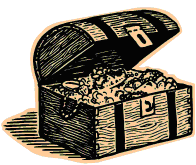Independent and Dependent Events
Reference > Mathematics > ProbabilitySometimes more than one event is happening, and we need to be able to calculate the probability of something happening in both events. In order to do this, we need to be able to recognize whether two events are dependent or independent. We covered independent events and dependent events in our unit on Counting Principles, but we'll provide some more explanation and examples here.
Independent Events
Two (or more) events are independent if the outcome of one event has no effect on the outcome of the other(s).
I roll a six-sided die twice. Does the outcome of the first roll affect the outcome of the second roll? No! No matter what I roll the first time, the second time I roll the die, the probability of any number appearing is still exactly
This may seem obvious, but under some circumstances we forget the concept of independent events, and get a little "superstitious" about outcomes. Suppose I was tossing a coin, and it landed on heads ten times in a row. I would be tempted to think, "The next time HAS to be a tail!" I would start to feel that, since I'd rolled heads so many times in a row, it was somehow "time" to get a tail, and that tails would be MORE likely because I hadn't seen it in so long. But the coin has not changed - if it's a "fair" coin, the probability of getting tails is still 0.5.
Dependent Events
Two (or more) events are dependent if the outcome of one event affects the outcome of the other(s). Thus, one event "depends" on another, so they are dependent.
Example
I draw two cards from a deck of 52 cards. Does the first event affect the second event? Yes! If I draw an ace of spades as my first card, ace of spades is no longer possible for the second card because it's no longer in the deck. Furthermore, once I've drawn the first card, I now have fewer possible outcomes for the second event, because there are only 51 cards in the deck!
Drawing with Replacement
I draw (with replacement) two cards from the deck. This means that I've drawn one card, but after I've drawn it and looked at it, I slide it back into the deck before drawing the second card. Since the card I drew is now back in the deck, that means it's a possible outcome for the second draw, and I haven't decreased the number of possible outcomes. Thus, these would be independent events.
Sample Question
I have a drawer with 10 socks in it. Six are blue, and four are red. I randomly select a sock from the set of blue socks, and then I randomly select a sock from the set of red socks. Are these independent events or dependent events?
Answer
Since I'm not drawing with replacement, it's tempting to think that these are dependent events, but they are not. Since I've specified that the first draw is blue, it has no effect on the number of reds, so the "draw a red sock" event is not affected by the "draw a blue sock" event. These are independent events.
For each question below, state whether or the events are dependent or independent.
Questions
 Complementary Outcomes
Complementary Outcomes Compound Events
Compound Events
